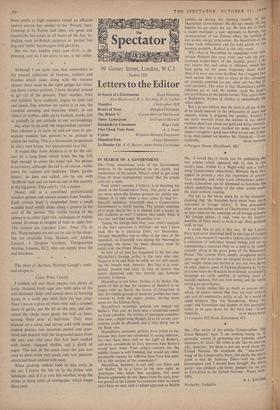Letters to the Editor.
In Search of a Government Hugh Han ning Alan Blackwood, R. L. Kilching,.P. A. Lusher Manalive Christopher Hill Breach of Trust Douglas Fairbanks The Bristol Canon Mervyn Stock wood Those Lamp-posts Sir Francis Meynell Standards for Consumers Roger Falk First Check Your Facts A. S. &ere Cyprus Brigadier Bernard Fergusson Mansfield Park Angus Macintyre Le Demier Cri A. 0. Baxter, Anne-Marie Crevectvir
IN SEARCH OF A GOVERNMENT S1R,—Your anonymous critic of the Government deserves to be congratulated on the clarity and moderation of his attack. What a relief to get away from all those high-pitched voices! But his article calls for a reply.
Your critic's mistake, I believe, is in directing his attack at the Conservative Party. The party as such has never given the faintest grounds for public con- fidence. It is only when a man arises to lead it— Disraeli, Salisbury, Churchill—that a Conservative Government is worth having. The proper criterion of it must always be: is it blessed with a leader in this tradition or not? I believe that under Eden it was not, and that under Macmillan it is. .
Taking the foreign field first; your critic's analysis of the Suez operation is brilliant—the best I have read. But he is attacking Eden, not Macmillan. Though Macmillan was in office at the time of the operation, as Churchill was during the Norwegian campaign, the blame for these disasters must lie solely with the Prime Minister.
In view of all that has happened in the last year Macmillan's foreign policy is the only wise one. Negative it is, and inust be while we are still repair- ing the breach with America. But that it is com- pletely 'passive and inert' in face of threats was surely disproved only two months ago, however clumsily, in Oman.
Macmillan is not Eden. Neither is he Butler. The proof of this is that the chimera of Butskell is no longer with us. Surely the lesson of .Gloucester is that the middle ground of domestic politics has been vacated by both the major parties, leaving more room for the Liberal Party.
Macmillan's economic policies are indeed not Butler's. This year we have seen a concerted assault on food subsidies, the raising of insurance contribu- tion rates, a Right-wing Budget, in as far as any con- cessions could be afforded, and a very sharp rise in the Bank rate.
Macmillan's economic policies have failed so far, because they have not succeeded in curing inflation; but they have been well to the right of Butler's, and more considerate to Tory interests than Butler's would have been. Your critic's concern for the middle classes is well founded, but would any other practicable remedy for inflation have been less pain- ful to this section of the community?
Macmillan, however, is not only not Eden and not Butler; he is a force in his own right, as Americans who know him recognise, but most Britons apparently do not. Apart from the early post- war period of the Labour Government when in recent years have we seen such a radical approach to British bqnnet, he got under the car. He then put in hand a major overhaul; a new approach to Europe. the reconstruction of our defence effort, the trebling of our atomic energy programme, the demolition ot the China trade differential and the bold attack On our housing problem. Radical is the only word.
Why-then is Macmillan so unpopular both With
serious thinkers like your critic and with the pro- fessional carpet-biters of the popular press? 1 d" not believe the real cause is inflation, which has been going on for years frequently much faster than it is now; nor even the Rent Act. I suggest two main causes. One is that so many of his colleagues are patently unsuited for any other job but that of club secretary. The other is that Macmillan's public relations are so bad. He neither reads the papers nor contributesio the public forum. This, apart from a Baldwinish rhythm of -vitality, is undoubtedly his worst defect.
But I do 'not believe that the fault is all his. It lies
in no small measure in the philosophy of angst and anarchy which is gripping the country. Frank!) 1 am more worried about the decline in our moral reserves than I am about our gold and dollar reserves. It seems that we have reached the point where vie cannot recognise a good man when we see one. If that is so, then indeed we deserve Mr. Gaitskell.—yours faithfully,


































 Previous page
Previous page